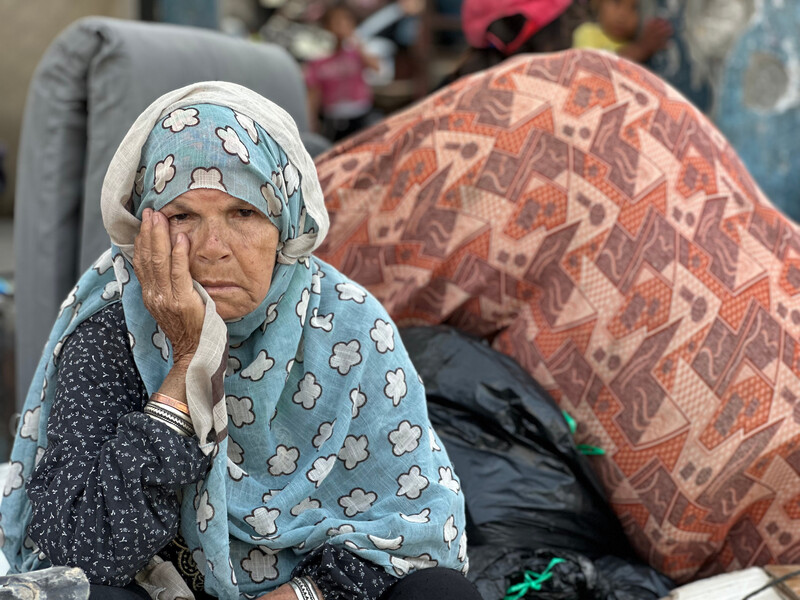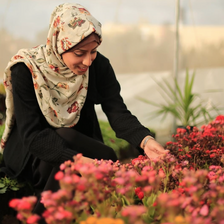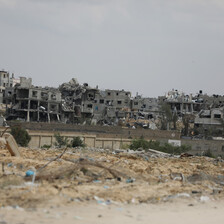The Electronic Intifada 17 June 2025

A woman in al-Mawasi after the Israeli military ordered the evacuation of a large swath of Khan Younis, southern Gaza, on 19 May.
APA imagesDisplacement from home is like the soul leaving the body.
I recently wrote and spoke about my experience during the Israeli army’s incursion into the so-called Morag corridor near al-Fukhari, the agrarian area near Khan Younis, southern Gaza, where my family and I live.
But my story with the war is not over. The episodes of suffering come one after the other. The most difficult of them all was being forced from my home around a month ago.
In the evening of Tuesday, 13 May, my area was turned into a war zone. Suddenly we heard heavy missiles in the vicinity of the nearby Gaza European Hospital falling with such incomprehensible force that the house shook and almost collapsed on us as we screamed in terror.
The air was very foggy and filled with smoke and we couldn’t see each other. We left the house to check on our neighbors and to try to see what was happening in the neighborhood. What I saw were people running and screaming in grief.
Israel said that it had attempted to assassinate Hamas leader Muhammad Sinwar in what they claimed was a command center under the hospital. At least 28 people were killed and dozens of others were injured in the attack.
At least 25 members of the al-Afghani family, who live near the hospital, also lost their lives in a strike on their home. Ongoing Israeli strikes prevented the rescue and recovery of at least 14 members of the family trapped under the rubble.
Escape from death
We were supposed to have been at the Gaza European Hospital around the time of the massive attack.
My mother had an appointment at the hospital to prepare her for spinal surgery the following day. But we planned to go early in the morning on the day of the surgery instead because we live so close to the facility.
Harrowing CCTV footage of the attack shows that we were lucky to have escaped death. When the army targeted the hospital courtyard, it was crowded with patients, visitors and people from the neighborhood.
On Wednesday, we contacted my mother’s doctor to ask if he would still be able to perform the operation on my mother. He asked her to come to the hospital because he thought he might still be able to.
My mother and I went to the hospital at 9 am and on our way in and while we waited for the doctor, we saw the extensive damage caused to the hospital by the fire belts that targeted it: craters and deep cracks and downed infrastructure in the road outside the hospital entrance and sprawling fractures and broken tiles in the walls and floors inside the facility.
Two hours later, the doctor told us that the operation had been postponed. As we were about to head out, the Israeli army bombed a bulldozer outside the hospital being used to clear rubble from yesterday’s attack. Doctors and patients were running, afraid of another attack on the hospital, and I was afraid of being trapped inside.
When the bombing stopped half an hour later, my mother and I hurried out of the hospital – amazed to still be alive – and found my sister and uncle waiting for us outside, far from the hospital gate, to check on us.
Determined to stay
Many people in the area, fearing for their lives, fled to other parts of Gaza after the previous day’s attack. But we were determined to stay, as were some of our neighbors.
The following days were not easy, as there was continuous and heavy artillery fire around the hospital and the neighborhood. I always said I could bear everything in the war except displacement from my home – I had already been displaced three times during the current war for a night or two. After our latest displacement last July, we decided not to repeat the experience even if it meant dying in our homes.
And so we lived for a whole week under constant and heavy shelling and quadcopter fire before the army suddenly attacked the area next to us on 20 May.
That night, we did not sleep for a moment due to the shelling and the sound of tanks approaching the neighborhood. We waited for sunrise for this nightmare to end but it did not stop.
I saw our remaining neighbors fleeing their homes. My brother Muhammad was very worried because our mother was not in good health and would not be able to run if something unexpected happened in the neighborhood.
Muhammad wanted me to persuade our mother to evacuate. I was adamantly opposed to the idea and told him that there was no safe place to go to and displacement would exacerbate our mother’s illness.
At around noon that day, we heard quadcopters firing bullets very close to us as the army encroached upon the hospital.
Our beloved and beautiful home – which we started building 10 years ago and only finished a few months before the war after so much hard work – has two floors and a basement. Half of the upper floor, which is still under construction, has a roof and the other half is exposed.
I told my sister and her children to stay downstairs and that no one should go upstairs or to the roof. I moved to my mother’s room to try to sleep a little but I slept for only a few minutes before I heard loud knocking on our door and one of the neighbors saying: “Get out of the house, the army is only giving us half an hour.”
I ran out of bed, fearing for my sick mother, who I tried to comfort. I had a bag with my laptop and some very important items, such as gifts from my students, notebooks and other things I need for work.
I grabbed my bag, put on my clothes, took my mother and left the house. The neighborhood was empty by now, as most of the other residents had already left. My brother yelled at me to take our mother and go in my cousin’s broken-down car towed by a truck, with no other transportation available. I left behind my sisters, my nieces, my brother and my father. I could hear the gunfire and shelling and was very afraid for them. I asked them to be careful and stay safe, and that I would see them again.
From the car, I saw people walking down the street, fleeing with only what they were wearing. With no time to prepare, we also left everything in our house: food, clothes, everything.
Into the unknown
My heart ached as we traveled farther away from my beloved neighborhood and home. We were heading into the unknown, and my mind was occupied with concern for my sisters and father, whom I had left behind as they tried to find transportation. I was having difficulty communicating with them because the internet and communications had been cut off in our area after the bombing of the hospital.
We all wound up at my aunt’s house in Khan Younis refugee camp, west of the city, several miles away from al-Fukhari.
My aunt’s house consists of concrete blocks placed on top of each other to form a room covered with a zinc roof. There are open holes instead of covered windows, and plastic tarps and blankets are the only means of insulation. It is a far cry from the home that we worked so hard to build in al-Fukhari to suit our family’s needs.
People in the camp, which is completely destroyed and full of tents and rudimentary shelters, depend on aid for their basic needs such as water and food. Our lives are now characterized by a different kind of suffering that weakens our strength and saps our energy.
The daily routine consists of getting water – sometimes this means walking to a water distribution point and carrying back heavy containers. When there is no water at the distribution point, we spend a lot of money to buy it.
Everything is hard.
We spend our days searching for flour to bake bread and looking for wood to light a fire and cook food. We started buying things to replace what we left in our house, living as though we are starting from scratch.
We don’t have information about our home or our neighborhood. Everyone was forced to leave and with the army targeting anyone in the area, it is too dangerous to go back. We do not know what was happening there, compounding our sadness.
No hope
I wake up trying to comprehend what I’m enduring. New displacement orders are spreading to areas in the city of Khan Younis and are encroaching upon us. We wait moment by moment for news about the ceasefire negotiations, with no hope to save us from this nightmare.
The intense fear, hunger, my mother’s illness, the fact that I couldn’t leave Gaza and save myself, concern for my home, the exorbitant prices for life’s necessities – all of it leaves me psychologically exhausted. Sometimes I feel like I might lose my mind.
Each second I am forced to live away from my home, with no semblance of safety and stability, is oppressive. I cannot adapt for a moment to this reality in the camp imposed on us by the war. The house is unsafe and cannot withstand the powerful missiles that are falling in the camp’s vicinity. I feel terror when it shakes.
I have worked hard to continue to deliver my message during the war. I am amazed that I am still able to think about work, even though I often feel that I will lose everything due to the difficulty of the situation we are living in.
How long will we remain like this? When will this war end? Will we live through something even worse than what we have endured for more than 600 days?
There are so many questions that we can never find answers to as we have been abandoned and left to face our fate on our own.
Ruwaida Amer is a journalist in Gaza.





